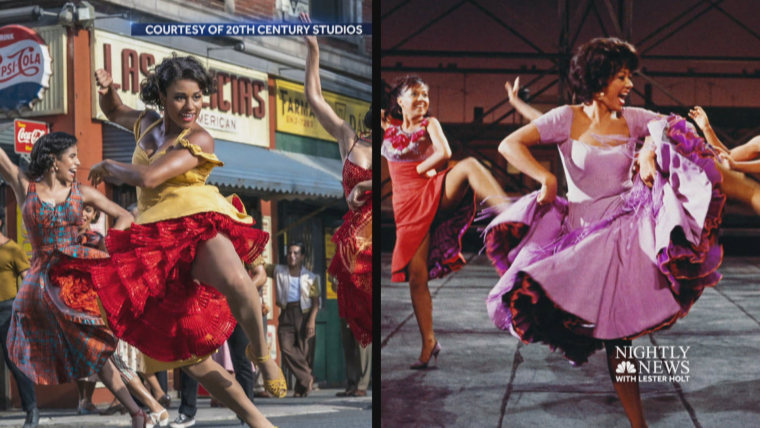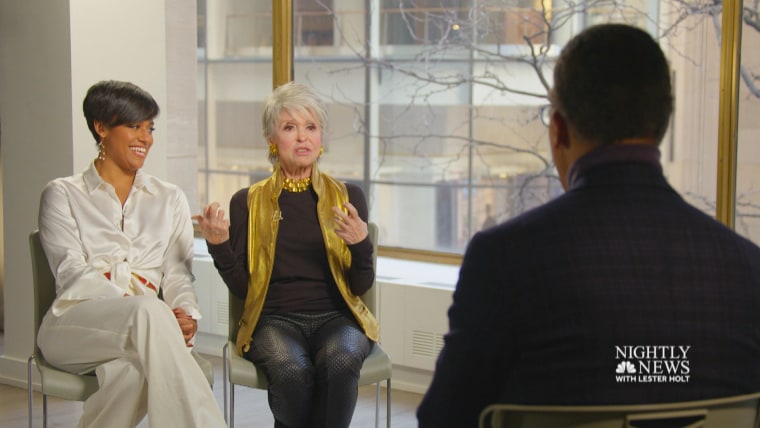During rehearsals for Steven Spielberg’s remake of “West Side Story,” it became evident how much Rita Moreno misses playing Anita, the groundbreaking role she originated in the 1961 film version of the acclaimed Broadway musical.
Ariana DeBose, who is reviving the role in Spielberg's version, said she remembers looking at Moreno out the corner of her eye and seeing her dance to some of the show tunes as the cast practiced their choreographies.
Moreno agreed, saying every time DeBose would do something spirited, she would try doing it. "I couldn’t help it," she said.
In a joint interview with NBC News, both Moreno and DeBose recognized how Anita has become an even more relevant Latina character six decades after “West Side Story” premiered on Broadway.
The story of the original 1957 Broadway musical was created as a modern version of the William Shakespeare classic “Romeo and Juliet.” Set in the 1950s, “West Side Story” centers on the rivalry between two teenage street gangs — the Jets, a white gang, and the Sharks, a Puerto Rican gang — as their communities faced displacement during New York City’s urban renewal period. Their rivalry intensifies when Tony, a Jet, falls in love with Maria, the young sister of Sharks leader Bernardo.
Anita, Bernardo’s girlfriend and Maria’s friend, is Puerto Rican like the rest of the Sharks. She stands out for her assertiveness and captivating dance skills.
“Anita is inherently a woman who knows her own mind. She’s a woman ahead of her time. She has agency, and she does speak up,” DeBose said. “In 1957 or 1961, that is an anomaly.”
Now, “West Side Story” is an iconic period piece that has been revived countless times on stages worldwide. In every iteration, including Spielberg's film remake, the role of Anita continues, withstanding the test of time.
An Anita for a new generation
In the remake, Anita doesn’t shy away from bringing up issues of colorism and racism within her own Latino community — and how it affects her perception of the world. In one scene, Bernardo suggests that Anita is not really part of his family, even though they all live under the same roof and she pays rent. Anita calls him out in Spanish, asking if he said that because she is “prieta,” Puerto Rican slang for dark-skinned or Black.
“I was very adamant that whatever interpretation I delivered for this performance was going to be massively different,” DeBose, who is Afro Latina, said. “By virtue of being a Black woman, that makes it a different portrayal, because my physical manifestation has to inform this particular version.”
The scene serves as a stark contrast to the fact that Moreno was forced to wear brown makeup to darken her skin in the first “West Side Story” film — even though she was the only Puerto Rican member of the original movie cast.
The veteran actor recalled a time when she complained about being in brownface to a makeup artist on the 1961 film set. She said he replied, "What are you, racist?"
"I couldn’t even think of an answer," Moreno, 90, said.
This is partly why Moreno "loved that an Afro Latina was going to play Anita," she said. "It seemed absolutely right."
DeBose, 30, said she is drawing from both her professional and personal experiences to provide “a fresh take” on Anita’s character.
The actor, singer and dancer rose to prominence after joining the original cast of Lin-Manuel Miranda's smash Broadway musical “Hamilton” and appearing on Apple TV+’s “Schmigadoon!” as well as Netflix’s “The Prom.”
DeBose grew up with a white mother and an Afro Puerto Rican father in North Carolina, a place where she lacked access to her Latin culture, she said.
“This is not a singular experience. There’s many Latinos who don’t feel like they are close with their roots,” DeBose said. “In our communities, we unconsciously invalidate each other’s lived experiences in subtle ways, but ‘West Side Story’ allowed me to be immersed in the lived experience I always wanted.”
That experience included being constantly exposed to Spanish, meeting other Latino actors and learning about the history of the Puerto Rican diaspora in New York City, DeBose said, adding that she felt the most herself on set because, for her, it validated that “being Latino is not a monolith.”
“You could look like Rita, you could look like me, you can be born into the surroundings that allow you to experience the music, to experience the food, or perhaps you were not,” she said. “There are many ways to be Latino in this country — as a biracial Afro Latina, I have a very mixed identity. I also identify as queer.”
“As an actor, your lived experiences can and should inform a portrayal,” DeBose added.
Moreno has praised DeBose's performance in Spielberg's remake. “She’s a beautiful Anita in the movie,” Moreno said.
DeBose said the remarks carry a special meaning, considering how “there’s no way in the world any woman taking on this particular endeavor wasn’t going to feel a tremendous amount of pressure.” Moreno’s portrayal of Anita in the original film earned her a Golden Globe and an Academy Award, making history as the first Latina to win the honor.
"She means a lot to me," DeBose said of Moreno. "She means a lot to the Puerto Rican community. She means a lot to the Latino community and to the entertainment industry at large."
‘How far have we really moved forward?’
Moreno is back on Spielberg’s remake as an executive producer and as Valentina, a new role created specifically for the film. Valentina is based on Doc, the character who owned the store where the Jets hung out in the original film.
“She’s just such a long way from Anita, who is volatile and has an opinion and all that. She does too, Valentina, but her opinions are stated in a more subtle way,” Moreno said. Valentina also serves as Tony’s voice of reason.
DeBose and Moreno share one of the most intense scenes in Spielberg’s remake: when Valentina catches the Jets assaulting Anita inside her store.
Moreno said the scene “really hit home” for her, since that scene was one of the most difficult to film when she was playing Anita. “It was so bizarre, because suddenly I was playing another role,” she said. In the new version, Valentina defends Anita and blasts the Jets for seeing them “grow up into rapists.”
In the process of reimagining the role of Anita for Spielberg’s film, DeBose said she often found herself relating to the character in a way that made her wonder whether American society has really progressed enough since the 1960s.
“Characters can be both part of you and separate from you,” she said. “I still experience many of the things that you see Anita experience in this film. So then it begs the question, how far have we really moved forward?”
“I have the benefit now of being a modern-day Anita, and speaking my mind comes very naturally to me,” DeBose said, as well as being “able to use my lived experience to validate Anita, even though we’re women of two different time periods.”
“You could say I reap the benefits of characters like Anita,” she said.
Follow NBC Latino on Facebook, Twitter and Instagram.
"story" - Google News
December 12, 2021 at 10:14PM
https://ift.tt/3IDU36B
In ‘West Side Story’ remake, Ariana DeBose reinterprets Rita Moreno’s Anita for a new generation - NBC News
"story" - Google News
https://ift.tt/2YrOfIK
https://ift.tt/2xwebYA
Bagikan Berita Ini
















0 Response to "In ‘West Side Story’ remake, Ariana DeBose reinterprets Rita Moreno’s Anita for a new generation - NBC News"
Post a Comment